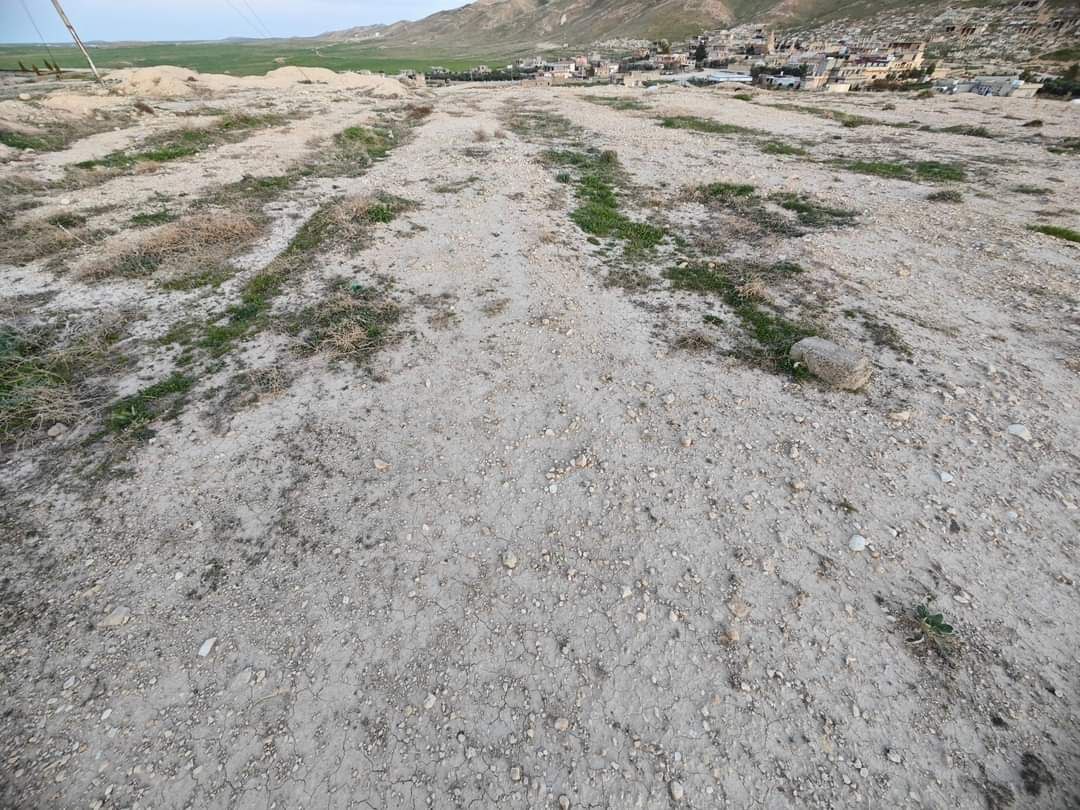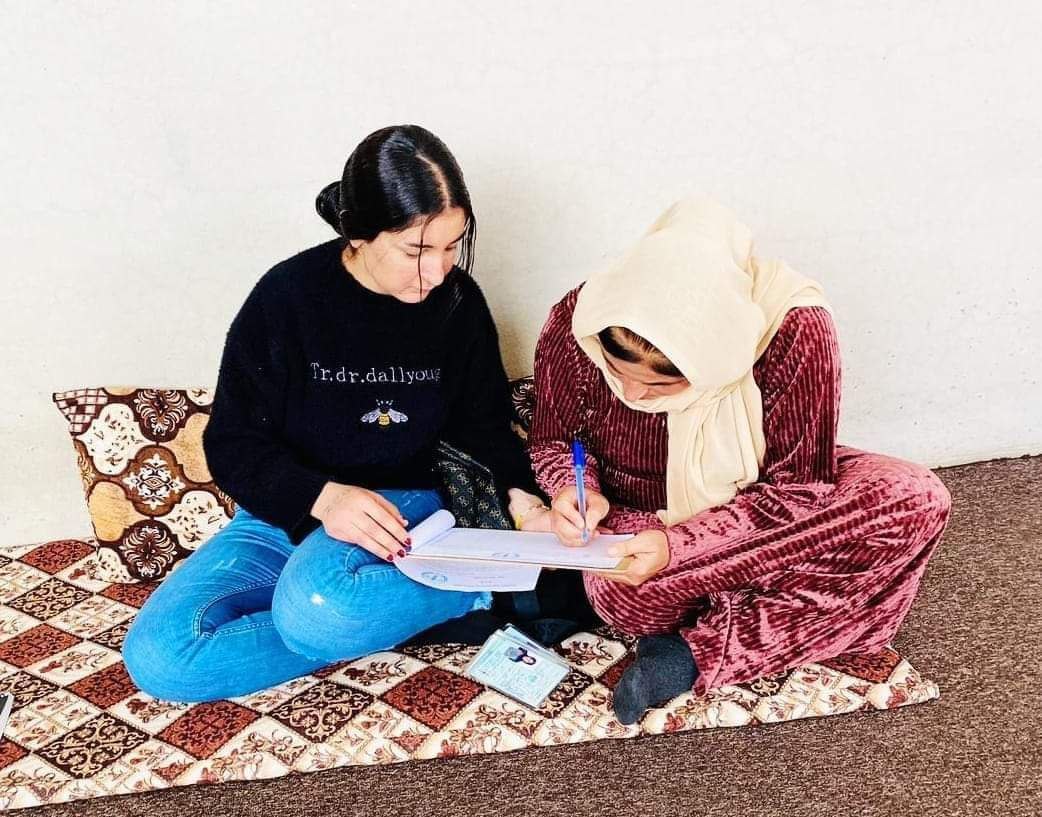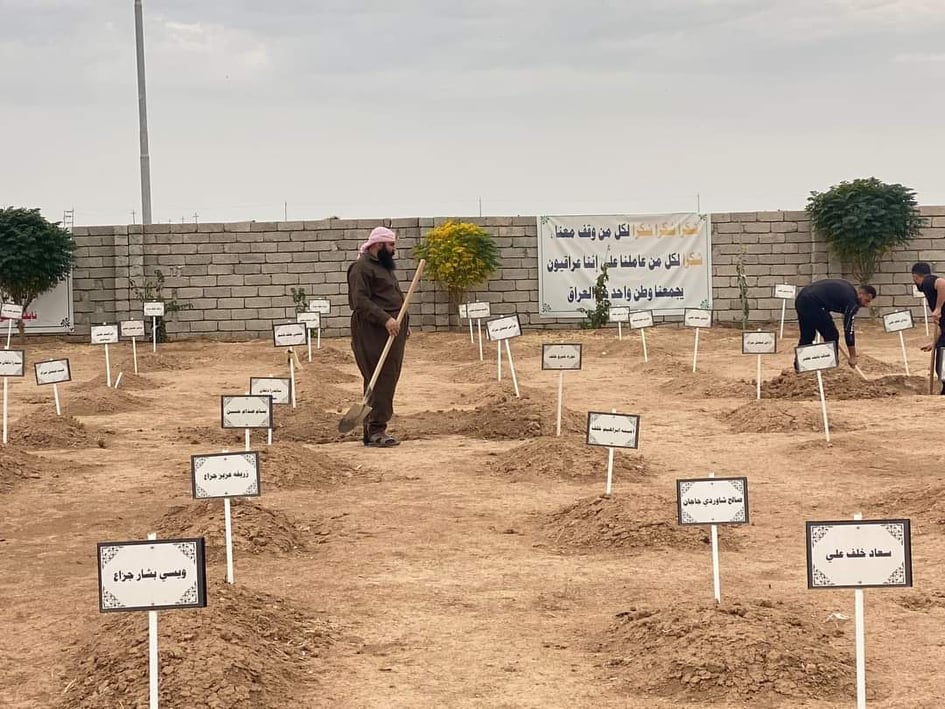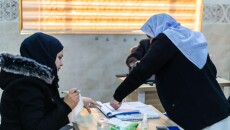Sabah's father was killed by extremist militants of the Islamic State of Iraq and Syria ISIS ten years ago, and he is still looking for his remains so that his identity can be officially identified and his grave has a witness.
“One crime was committed against us twice, once when Daesh militants killed my father and again because I do not yet know where his remains are,” says Sabah, whose two uncles were also killed by ISIS militants in August 2014.
The remains of 66 other victims like Sabah’s father were recovered years ago from mass graves in the Shingal (Sinjar) district home of the non-Muslim Ezidi (Yazidis) community and reburied without being subjected to tests to identify their identities.
According to KirkukNow's observations, the remains of Sabah's father and uncles were reburied near the Sharaf al-Din shrine after Shingal was retaken from ISIS in 2015 by the Ministry of Martyrs' Affairs of the Kurdistan Regional Government KRG.
Sabah’s father was an employee in the Nineveh Health Directorate. His pension payment was suspended two years ago because he had not been issued a death certificate.
I do not know the location of my father’s remains
“Wherever we go, they ask us for a death certificate, but I do not know the location of my father’s remains. In 2015, his remains were recovered among the remains that were found in two cemeteries but they reburied the remains without conducting a DNA test to identify the victims.”
The two cemeteries mentioned by Sabah are located between the Khansur and Sinuny areas of Shingal district.

The remains of the victims that were reburied do not have names or information on their gravestones so that we can identify them.” Sabah explained that without this information and documents, they cannot issue a death certificate, and he believes that the solution is for the KRG to agree with the federal government to excavate the graves and conduct examinations of the remains to identify them.
In August 2014, ISIS militants attacked Shingal, as a result of which 1,293 Ezidis were killed in addition to the kidnapping of thousands, some of whom are still missing.
Khairy Ali, the official of the Petrichor organization concerned with human rights - which follows up the file of the remains of 67 Ezidis - told (KirkukNow), “The two mass graves in which the remains of 67 people were found were exhumed by the Ministry of Martyrs’ Affairs in the regional government... but they were not dug up. No DNA tests were conducted and no death certificates were issued for them.”
Ali explained that opening mass graves, according to the law, is within the powers of the National Foundation for Opening Mass Graves of the Iraqi government.
“The place where the remains of the 67 Ezidis were buried has no signs indicating that it is a cemetery. It is a flat area that resembles a street. The graves have no evidence, meaning that the remains were reburied illegally,” according to Ali.
So far, approximately 90 mass graves have been found within the borders of Shingal District, in addition to dozens of individual graves all killed and buried by ISIS militants.
The remains that were found in 2015 were thrown on the ground, not buried
Ayman Bamerni, a member of the investigation and document collection body at the Ministry of Martyrs’ Affairs of the KRG, said, “The remains that were found in 2015 were thrown on the ground, not buried. Our teams buried those remains in another location at the request of the people to preserve evidence.”
The demands of the families of the 67 remains reached the Ministry of Martyrs’ Affairs but without results.
“We must meet with the Iraqi Department of Mass Graves to find a solution.”
Bamerni added that the remains were exhumed by the Law for the Protection of Mass Graves in the Kurdistan Region, and tests were conducted in Erbil, but "we do not know why the results were not published."
The families of the Yazidi victims are embarking on a campaign to collect signatures to deliver the case to Baghdad so that the graves of the victims can be reopened and tests to determine their identities can be conducted.

The official of the Petrichor organization said that they are seeking to collect 5,000 signatures in Shingal as a pressure card to oblige the Iraqi government to open the graves of the victims.
“Baghdad is currently refraining from doing so because it says that the burial took place illegally at that time,” while Ali believes that the importance of identifying the victims’ identities lies in the fact that their families will be able to benefit from the privileges granted to the families of the martyrs, and these victims will also have graves bearing their names.
In March 2019, the first mass grave for Ezidis was exhumed in the village of Kocho in the Shingal district by the decision of the Iraqi government. So far, about 50 mass graves have been exhumed, and the remains of hundreds of victims were sent to Baghdad for identification. Some of them were returned and buried in special ceremonies.
IS reportedly used the women and girls as sex slaves. Tens of thousands of Ezidis are still living under tents in camps for the Internally Displaced Persons IDP, mainly in northern province of Duhok.
Amid the atrocious attacks of IS, 1,293 Ezidis were killed, 68 shrines were destroyed and over 80 mass graves have been discovered.
Local and international organizations are cooperating to build a cemetery and a memorial for Shingal massacre.
Dana Amin Mansour, director of mass graves in the KRG Ministry of Martyrs Affairs said, “The bone samples (of the remains of victims who were buried in 2015) are in the Forensic Evidence Directorate in Erbil. We explained all matters to Baghdad in an official letter. They must take bone samples for victims with blood samples from the victims’ families to complete the examinations and the process of identifying the victims.”
He pointed out that they are part of the National Department of Mass Graves in Baghdad and that the recovery of the 67 remains was not a “spontaneous and illegal” act.
“We have done what we are responsible for and the rest falls on the shoulders of the Iraqi government. Why have they not come yet? You must direct this question to them,” he added.
“What is related to issuing a death certificate is within the jurisdiction of the court, and Baghdad is responsible for the final result of the process.”






